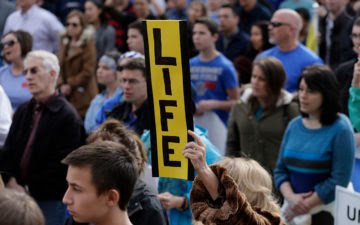
When most Americans think of sanctuary cities, they think of predominately liberal jurisdictions that have vowed to protect undocumented immigrants from what they view as overzealous federal immigration policies.
But in the last year or so, conservative cities and counties around the nation have co-opted the term, declaring themselves sanctuaries from attempts at gun control — and now, abortions.
Ten towns in Texas have voted to declare themselves “sanctuary cities for the unborn,” with most adopting ordinances that claim to outlaw abortion within city limits. At least 13 cities are considering such ordinances, and three — Mineral Wells, Omaha and Jacksboro — have already voted against them.
Most of the towns that have enacted the anti-abortion ordinances have populations of less than 6,000 people. None have abortion clinics.
The town of Waskom, with a population of 1,900, became the first “sanctuary city for the unborn” last June, according to the anti-abortion movement leading the charge across Texas. The town of Gary, with a population of 300, became the latest one last week, joining others like Naples, Joaquin, Gilmer and Rusk.
The language of the ordinances varies from city to city. Some, including the ones passed by Waskom and Joaquin, define abortion as “murder with malice aforethought,” ban emergency contraception such as Plan B, declare organizations like Planned Parenthood as criminal and fine medical providers who perform abortions.
In reality, the ordinances are criminally unenforceable because of the Supreme Court’s 1973 ruling in Roe v. Wade, which established the right to abortion nationwide. That means abortion remains legal in Texas.
Mark Lee Dickson, the activist behind the Sanctuaries For the Unborn movement and the director of Right to Life of East Texas, is well aware of these limitations. But in the event that the Supreme Court does reverse its opinion on abortion rights, the ordinances will be in place to penalize those who performed abortions, or otherwise “aided and abetted” in the procedures.
“The idea is this: in a city that has outlawed abortion, in those cities if an abortion happens, then later on when Roe v. Wade is overturned, those penalties can come crashing down on their heads,” Dickson told CNN.
Additionally, the ordinances give the family members of someone who has received an abortion the right to sue the abortion provider — something that Dickson said local courts will be able to enforce.
“For so long, we have put our hope in our state capitols, in our nation’s Capitol, when all along we need to be battling these battles on the home front of our cities,” Dickson said. “If an abortion clinic moves into our city, it’s not Austin’s problem, it’s not Washington D.C.’s problem, it’s our problem. It’s going to affect our communities, so that’s why we’ve got to stand up and proactively do something.”
Not all anti-abortion activists agree that waging this fight on the local level is the best strategy. Some groups, including the Texas Alliance for Life, have cautioned against approaches that are unlikely to be held up by courts, according to the Texas Tribune.
But Dickson argues that the ordinances are not intended to provoke legal challenges.
“This ordinance specifically was not meant to provoke a lawsuit that would overturn Roe v. Wade,” he said. “This ordinance was meant to keep cities out of lawsuits. We wrote it in a way that really protects both the cities and the unborn.”
Advocates for abortion rights argue that while the ordinances cannot actually outlaw abortion, they are spreading misinformation to those seeking the procedure.
“They are a really harmful tactic by the Right to further marginalize low-income people, people of color and young people into thinking they can’t access healthcare choices which are well within their rights,” Kamyon Conner, executive director of the Texas Equal Access (TEA) Fund, told CNN.
The TEA Fund provides financial assistance to people who need help paying for abortions.
Organizations that advocate for reproductive rights have been receiving calls from individuals asking about whether they are still allowed to get abortions, according to Drucilla Tigner, reproductive rights strategist for the American Civil Liberties Union (ACLU) of Texas.
“Abortion is still legal in every city and county in Texas, as it is everywhere in the United States currently,” Tigner told CNN. “But one of the clear purposes of this ordinance is to cause confusion of individuals who live in these towns about whether or not they’re able to access rights.”
The ACLU of Texas said it is considering mounting legal challenges to the ordinances, although it has not yet announced any plans to do so.
The anti-abortion ordinances are part of a statewide trend of attempting to regulate abortion, Tigner said, and the ACLU expects that the ordinances will galvanize state lawmakers in the next legislative session to consider a ban on abortion in Texas, she said.
*story by CNN